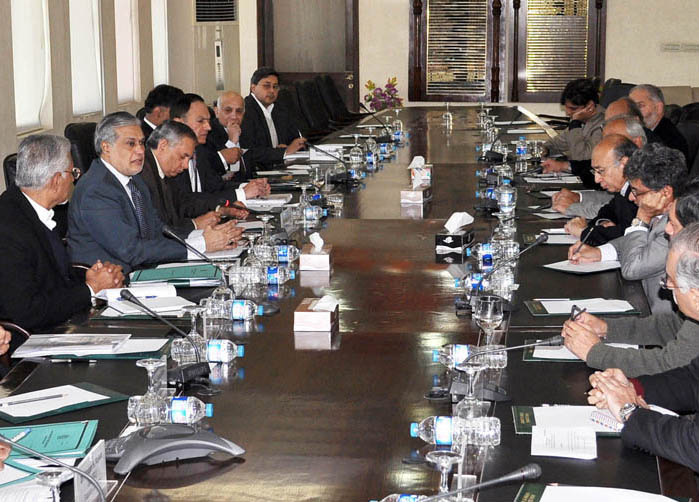
While addressing a gathering of the country’s top economists, Finance Minister Ishaq Dar discussed the state of affairs with his colleagues, and steps being taken by the government to fix the economy.
Dar claimed that the government would be able to increase foreign currency reserves to $16 billion by end of this calendar year. Excluding the liabilities, the reserves would stand at $10 billion, he informed.
He said the World Bank will give Pakistan a $1 billion loan, and the Asian Development Bank will provide $400 million, while the Islamic Development Bank will provide $730 million. He said the government was vigorously pursuing non-conventional sources including launch of Euro bonds of $1 billion and remittances-backed bonds of also $1 billion.
He said Pakistan will soon recover $800 million from Etisalat, and will also receive $1.54 billion from the United States on account of the Coalition Support Fund.

The EAC members questioned the authenticity of official data, particularly of inflation, unemployment and economic growth. They demanded that a committee should be formed to improve the quality of data and the International Monetary Fund’s (IMF) input should also be taken into consideration.
The inflation figures were unrepresentative and unrealistic to the extent that if the State Bank of Pakistan prints notes three times more than its present level, there would not be much impact on inflation statistics, said a member of the EAC.
During the meeting, Dar said he was running most of the government’s affairs and without his assistance the matters of other ministries would not be smooth. Critics say the centralised decision making bars others from taking any initiatives, while proponents argue that it will ensure fast decision-making, at least to the extent of economic ministries.
“I am overstretched and am a member of all committees, and without my assistance no matter proceeds further,” Dar was quoted as saying in the first meeting of the EAC. The EAC is a consultative group of the country’s leading economists, headed by Dar.
Dar consumed most of the time and spoke at length about all issues affecting the economy and people’s daily lives.
The issue of Dar’s involvement came under discussion when members of the EAC asked how they can give recommendations in sectors such as water and power. Dar said that without his involvement the dispute with Karachi’s transporters was impossible to be resolved. In the outgoing week, he also directed Ministry of Commerce to resolve 15-year old dispute with Russia, a matter which pertains to Ministries of Commerce and Foreign Affairs.
During the meeting, Dar told the economists that his four priority areas are: power, oil and gas, agriculture and social sector, the latter two are provincial subjects.
Dar sounded optimistic in the meeting, believing that the PML-N government was doing the right things, according to a participant of the meeting.
Published in The Express Tribune, January 12th, 2014.
Like Business on Facebook, follow @TribuneBiz on Twitter to stay informed and join in the conversation.
1731570357-0/elon-musk-(1)1731570357-0-405x300.webp)
-(1)1717678110-0/Kendrick-(1)-(1)1717678110-0-165x106.webp)















COMMENTS
Comments are moderated and generally will be posted if they are on-topic and not abusive.
For more information, please see our Comments FAQ